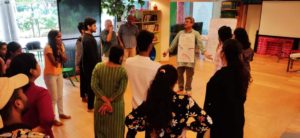Learning, to spite myself
Sept. 28
I watch where I walk. I stay aware as I amble along. Despite the focus, it can be easy to step right into the middle of it without even realizing you were heading straight for it. As the workshop opening day quickly approached, I met with a friend of mine who would accompany me in the workshop. I also met up with another friend who was sponsoring a different workshop series that I would lead. Squeezed in between those two workshops was the stuff I accidentally stepped into.
 First, there was some question as to why my friend would be accompanying me. Maybe there were some bad feelings, or a sense that my friend was taking
First, there was some question as to why my friend would be accompanying me. Maybe there were some bad feelings, or a sense that my friend was taking
advantage of me. On the other side, my sponsor friend faced some skeptical calls, wondering why he had bothered to ask for this unknown foreigner to lead workshops that, supposedly, some local artist educators could, supposedly, do. The quote, as I understand it, was ‘He’s a teaching artist. He doesn’t know about drama-in-education (die) or theatre-in-education (tie).’
Just as the workshops were about to start, the two stories diverged. In the first, my friend accompanied me to the initial workshop day, but an intense discussion broke out after the workshop about why my friend was there (who didn’t participate, just observed.) In the second, I came to understand that when my sponsor friend accounted the workshop, he got this negative response from a small number of people. But when two other workshop sponsors announced they were also working with me, two sponsors with a stronger track record locally, apparently the background complaints suddenly lessened in degree. But even they admitted there was some grumbling going on within the theatre/drama education community. ‘Why do we need this outsider?’
So, in the first story, my friend stopped coming. We have hung out, discussed the issue and its ramifications, but he is missing out. The good news, however, is that he is also friends with my workshop sponsor friend. So, we will all be at that second workshop series together.
As for the noisy background complaints, one of my local contacts laughed, joking that ‘all that discussion actually has been good publicity for our workshop!’ I myself found humor in the quote about being a teaching artist who lacks knowledge of die and tie. How does that even make sense? How can they complain when they don’t even know me or my work at all? Why is being an outsider such a big deal.
And then it struck me. I have registered the same complaint at home. I have insistently asked why are outside teaching artists brought into Hawaii, when we have local talent that can do the same thing. It struck me that I was laughing at myself. It gave me pause.
And helped me realize the single difference, a difference I want to be more cognizant of in the future. My complaint has been based on my knowledge of the other person’s work. And that complaint is not of the person’s WORK, but of the constant need to keep bringing that outside artist in. In India, my work is to train, offer my knowledge and experience to the participants and then go away. I want simply to build their capacity and then leave them to it. At home, my concern is that the outside artist keeps coming back. In other words, I support the sharing, but I am not so keen on replacing what could be regular work for a local artist.
My workshops in Delhi have concluded mostly thus: ‘We are developing our work in die and tie, and what you offer is something we don’t currently do. This will be useful as we continue our work into the future.’
Even as I finish this blog, I am not fully convinced that I have completely learned a lesson from all of this. But I do know that I am in the process of learning, if only to spite myself.
